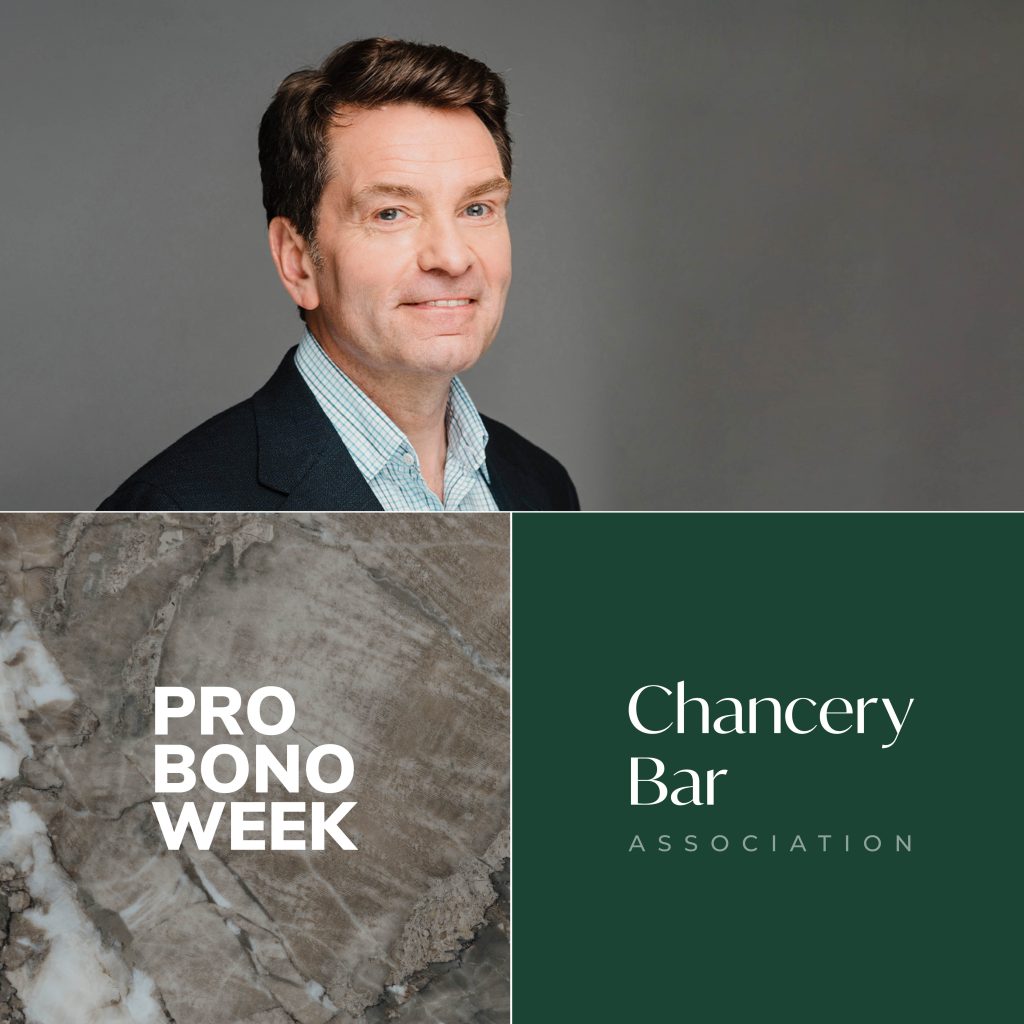The 23rd Annual Pro Bono Week in the UK, themed “The Power of Pro Bono,” shines a spotlight on the inspiring stories of lawyers and law students who dedicate some of their time on a pro bono basis to help those in need, ensuring access to justice.
Last week, we featured Alessia de Quincey’s reflections on her pro bono work with Chancery Bar Litigant in Person Support Scheme (CLiPS), a duty scheme designed to assist individuals representing themselves in the Interim Applications Court and the Central London County Court.
In this article, Neil Pigott, Partner at Pallas, shares his insights on how pro bono initiatives not only enhance access to justice but also offer significant personal and professional rewards for lawyers, drawing from his own pro bono experience with CLiPS.
How do you see pro bono work influencing the legal industry?
I see pro bono work as a partnership with the pro bono clients that is rewarding for lawyers both personally and professionally. A judge once told me that as lawyers, we are quite privileged, and giving back at any stage of our careers is important. It doesn’t have to be limited to those with years of experience; it can be relevant at any point.
Pro bono work influences the legal profession by enhancing its role in society and its relationship with the community, especially where access to justice can be very expensive. The legal profession should see itself as making a contribution to society beyond commercial activities. It also changes the perception of what the legal profession is about. If more firms encourage and support pro bono contributions of their lawyers’ time, it will positively impact the industry’s image and its societal role.
What challenges do you see in the current pro bono landscape, and how can law firms address them?
The current pro bono landscape faces several significant challenges. Firstly, law firms must provide financial support to organisations dedicated to expanding access to justice. This funding is crucial for their continued operation and impact.
Secondly, the most valuable resource law firms can offer is time. By encouraging team members to participate in initiatives such as the CLiPS scheme, lawyers can assist those with limited access to justice, while also gaining substantial personal and professional development opportunities. I try to volunteer four times a year with CLiPS and receive great support from Pallas. On my volunteering days, my colleagues assist to cover any urgent matters in my absence and provide research assistance and technical advice, when needed, on any CLiPS matter.
Thirdly, there is also a misconception that involving junior lawyers in pro bono work could lead to significant potential liability issues, especially in high-stakes environments like the High Court. This, in my experience, is not the case in the CLiPS scheme. Greater participation of junior lawyers in pro bono projects is critical and more firms should support these initiatives.
You regularly volunteer with CLiPS. What motivated you to participate in it?
The “LIPs” in CLiPS stands for “litigants in person,” referring to individuals or small businesses who, for various reasons, do not have legal representation in court. The CLiPS scheme offers a practical way to assist these clients with smaller matters in a court hearing for interim applications, which are the preliminary steps before a principal hearing in a dispute. I was drawn to the idea of giving back by supporting these individuals and small businesses who otherwise do not have access to legal representation.
Additionally, participating in CLiPS offers a unique opportunity for volunteering solicitors to gain experience across a range of subjects that might not come up in their day-to-day private practice. It also provides advocacy experience before High Court Judges in the Chancery Division. This experience is invaluable for developing advocacy skills in a senior division of the court.
What types of support do the CLiPS representatives provide to the litigants in person?
As a volunteer with CLiPS, you support the court and the judge, as well as the CLiPS client. The court begins its hearings at 10:30 AM. Arriving by 9:45 AM enables you to meet litigants in person who may have submitted documents ahead of time. If their case is listed, you prepare with them early. You also assist walk-ins who might not have given, or received, advance notice. Your role involves quickly determining if their matter is appropriate for the court, offering practical guidance, and, where not appropriate for an application, referring them to other pro bono organisations if needed.
If the matter is appropriate for the applications hearing, it is important that you delve further into the details to understand their case fully. Sometimes you may need to contact a specialist within the CLiPS service for assistance. You then present the case to the judge who will ask questions, and you must be prepared to respond thoughtfully. Negotiations with the other side often occur before reaching the judge. This is to see if a settlement may be reached without submissions to, and determinations of all issues by, the judge. Hearings of any matter before this court aim to be under two hours, but complex applications can take longer. In summary, there is no typical day at CLiPS. Each day brings unique challenges and opportunities.
Can you describe a memorable case you worked on through the CLiPS scheme?
One memorable case was my first with CLiPS. Initially, there was nothing listed. However, at lunchtime we received an urgent call. A community representative, a lawyer qualified in another country, came to represent a surgeon who was operating that day and could not attend court. High Court enforcement officers had visited the surgeon’s home that morning with orders for possession and sale, forcing him, his sister, and a six-year-old to leave. It was a cold day, and the sister and child had to drive around to keep warm.
The order had a potential defect due to a possible name mix-up with the surgeon’s brother, who was a judgment debtor. After confirming details with the surgeon, there was good evidence that this was probably a mistake. I contacted the creditor’s law firm and requested an urgent hearing. The court accepted our submissions and offer of undertakings from the client, and issued an order allowing the family back into their home that day. The judge stayed late to finalise everything, and we received a nice note from the judge in appreciation for our assistance. The urgency and positive outcome made this case particularly memorable.
What advice would you give to lawyers considering being volunteers with CLiPS?
Volunteering with CLiPS is a unique and rewarding experience. As a CLiPS volunteer, your role is to offer advice and representation before the applications court to litigants who would otherwise have to make their own submissions with the judge’s assistance. Many CLiPS clients arrive nervous and confused, unfamiliar with the court process and the court building, and in need of your help. It is personally very rewarding to help in those circumstances.
You will have to be prepared for a fast-paced environment where you need to establish personal trust with the CLiPS client quickly and listen carefully and patiently. Often, a small throwaway comment or response from the client can completely change your understanding of the case. The skills you will develop through the CLiPS scheme are consistently rewarding both professionally and personally.
The judges are extremely appreciative of the assistance given in CLiPS. The judges support CLiPS volunteers by accommodating requests for extra time on the day of the hearing to prepare to appear before them or to attempt settlement. They understand that a CLiPS volunteer will have had little time to take instructions and prepare.
To learn more about Pallas’ pro bono commitments, visit our Pro Bono page.

